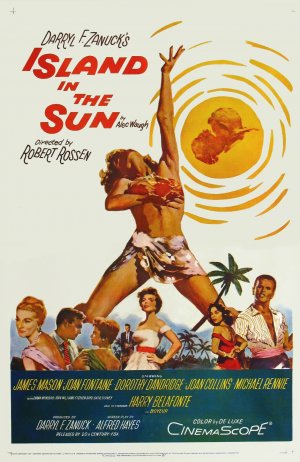
ISLAND IN THE SUN
US, 1957, 118 minutes, Colour.
James Mason, Joan Fontaine, Harry Belafonte, Dorothy Dandridge, Joan Collins, Michael Rennie, Stephen Body, Basil Sidney, John Williams, John Justin.
Directed by Robert Rossen.
Island in the Sun is based on an Alec Waugh novel and boasts big production values, many stars, director Robert Rossen and a hit song theme. The film is still quite interesting though it appears somewhat dated. The main trouble with it is that it has a number of plots which are all potentially interesting. They are taken up one after the other, hold our interest so that we tend to forget the other plots and ate then moved onto the next one. The mood is set well with the now-famous song as it is illustrated during the credits. The political and racial issues are spelt out rather obviously and melodramatically and, on the whole, the film settles for spectacle and melodrama rather than colourful, intelligent drama. What the film could have been is shown by James Mason's excellent performance as a rather neurotic landowner amongst the West Indians. His eyes, face, suspicious gestures show a tormented character. The other performers go through their paces well enough but are somewhat stereotyped, even Harry Belafonte. However, John Williams (reminding one of Dial M for Murder and To Catch a Thief, where he was excellent) has an entertaining sequence as the police chief confronting the murderer.
1. What mood and atmosphere did the theme song of Island in the Sun give the opening of the film?
2. How was the society of Santa Marta quickly sketched in - villas, swimming. governor and police, parties. black and white?
3. How was the sunny island life presented in the film - as happiness (beaches, swimming etc.), as work, (the crops, the fishing), as isolated and boring (for the rich white woman)?
4. How did Maxwell Fleurry sum up in himself the contradictions of life on the island - his name, mixture of British and French, his being a second son, his plantation, wife,, fast car, arrogance, yet his obsessive suspicion, hatred of the natives? How did his suspicions of his wife and his irrational murder of Carson symbolise what can be wrong with this kind of inbred, wealthy society?
5. Was the technique of exploring four stories at once successfully handled or did you find that you became interested in one and forgot the others as each came on the screen?
6. What was the effect of Maxwell's discovering his Jamaican ancestry? Why was he angry? Why was he then prepared to bluff it out at the club? How did it affect his election rally?
7. Why did he stand for election? Why did he capitulate to David's attack?
8. Why did he not commit suicide? How effective was the Inspector's technique of telling Maxwell what he would say to the murderer, the "Crime & Punishment" technique?
9. Was the romantic interlude too romantic and melodramatic - especially Mrs. Fleurry's revealing to her daughter that her husband was not her daughter's father?
10. What was the point of the romance between the white official and the black secretary? Was this love real? Was it a basis of a happy marriage? Why could they not stay on Santa Marta?
11. Was the character of David built up strongly enough to make him symbolise the emerging black power on his island? - at parties, amongst his people in their work, his song with the fishermen, at the rally?
12. Did he really love Mavis? Did she love him? Why could they not marry and stay on the island? Were their final reasons for parting valid? (Comment on his angry point about her eventually calling him 'nigger' and her point about him wanting to stay only on Santa Marta because he loved power.)
13. Did the film end pessimistically? What hope did it have left?
14. After discussing this film. do you think it was really just another romantic blockbuster, or was it something more?